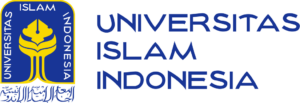Clean Water and Sanitation

Universitas Islam Indonesia (UII) has long been committed to environmental stewardship, and this is reflected in its proactive measures to manage water usage and ensure sustainability across campus. Recognizing the importance of water conservation, UII has implemented several initiatives that focus on minimizing water consumption, promoting wastewater treatment, and providing clean water access to all members of the university community. These actions align with UII’s broader environmental goals and demonstrate the university’s commitment to reducing its ecological footprint.
In line with its dedication to sustainable water management, UII has also adopted policies and systems aimed at maximizing water reuse throughout the campus. These initiatives focus on conserving water by reducing overall consumption and implementing water recycling practices for various campus needs, from irrigation to cleaning. By integrating these practices into its daily operations, UII ensures that water resources are utilized efficiently and responsibly, setting an example for other institutions to follow.
Beyond its internal efforts, UII plays an active role in promoting water conservation and good water management practices within the surrounding community. The university’s initiatives extend beyond the classroom, engaging in community outreach and partnerships to raise awareness about the importance of sustainable water usage. UII works collaboratively with local stakeholders to support water conservation projects and ensure that the surrounding communities have access to clean and safe water.
Through these ongoing efforts, UII demonstrates its dedication to creating a sustainable future, both on campus and beyond. By prioritizing water conservation and sustainable water management, the university not only reduces its environmental impact but also empowers its community to adopt responsible practices that contribute to a healthier planet. These initiatives reinforce UII’s broader mission of promoting environmental sustainability and advancing the well-being of future generations.
Water Usage and Care Measures at Universitas Islam Indonesia (UII)
Universitas Islam Indonesia (UII) systematically monitors its water consumption to ensure efficient and sustainable usage across its campus. The university employs a comprehensive system, including water meters, to measure and record the total volume of water utilized. This meticulous approach allows UII to track consumption patterns and identify areas for improvement, ensuring effective water management.
UII’s water monitoring system accounts for both mains supply and groundwater usage. To maintain compliance with regulations and promote responsible practices, the university pays a groundwater tax for its extracted water. This reflects UII’s commitment to not only meeting its operational needs but also adhering to environmental stewardship principles.
Accurate tracking of water usage enables UII to implement strategies that enhance cost-efficiency and sustainability. By regularly assessing its consumption data, the university can identify opportunities to reduce wastage, optimize usage, and align its practices with broader sustainability goals.
Through these efforts, UII demonstrates its dedication to responsible resource management, reinforcing its role as a leader in sustainable campus operations. This commitment to water conservation not only benefits the university community but also supports wider environmental and societal goals.
Universitas Islam Indonesia’s Initiatives in Sustainable Environment
Universitas Islam Indonesia (UII) has established robust systems to manage and treat both domestic and hazardous wastewater, ensuring minimal environmental impact and adherence to sustainability principles. These processes reflect UII’s commitment to responsible waste management and environmental stewardship.
For domestic wastewater, such as that generated from toilets and restrooms, UII employs an anaerobic treatment system using septic tanks. This approach effectively processes organic waste, contributing to safe and sustainable wastewater disposal. The system is designed to meet environmental standards while maintaining the university’s operational efficiency.
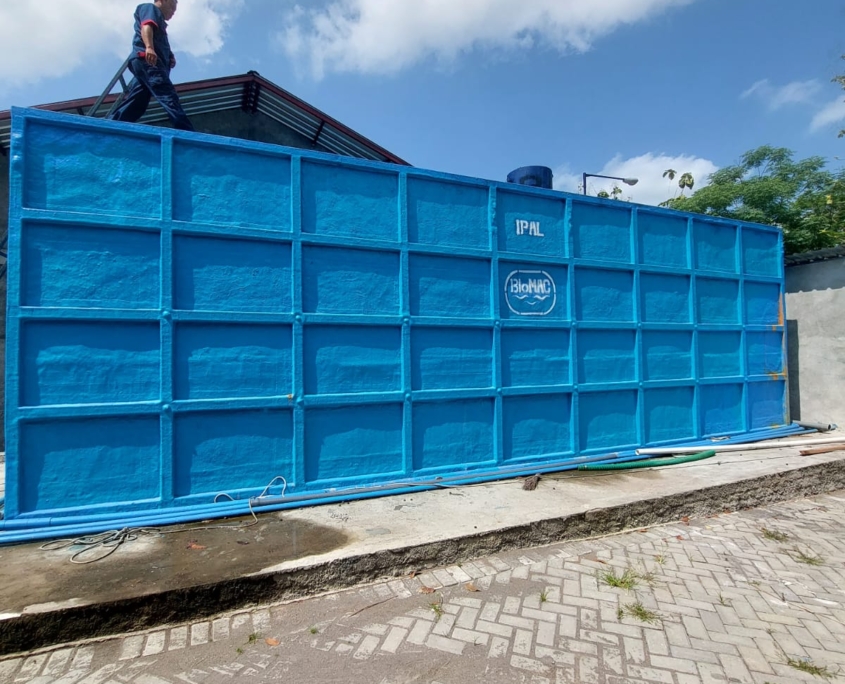
When it comes to hazardous wastewater, particularly from laboratory activities, UII implements specialized treatment methods, including adsorption and filtration systems. These systems are tailored to handle the unique properties of chemical and biological waste, ensuring that potentially harmful substances are neutralized before disposal.
To further enhance its wastewater management capabilities, UII collaborates with a third-party service provider under a Memorandum of Understanding (MoU). This partnership ensures that hazardous waste is treated and disposed of in accordance with regulatory requirements, safeguarding the environment and promoting sustainable practices. Through these measures, UII demonstrates its proactive approach to waste management and its dedication to preserving environmental health.
Universitas Islam Indonesia (UII) takes comprehensive and proactive measures to prevent water pollution, with a strong focus on managing hazardous waste to protect the surrounding water systems. The university’s approach is rooted in strict adherence to environmental best practices, ensuring that all potentially harmful substances are effectively managed and disposed of to prevent contamination.
To address hazardous waste, particularly from laboratory activities, UII implements stringent handling and disposal protocols. This includes segregating hazardous materials from other waste streams, employing specialized containment measures, and utilizing appropriate treatment technologies. These efforts are designed to neutralize harmful substances before they have any chance of entering the water system.
In addition to its internal protocols, UII collaborates with certified third-party service providers to ensure the safe treatment and disposal of hazardous waste. These partnerships operate under formal agreements, such as Memorandums of Understanding (MoUs), which ensure compliance with national regulations and global environmental standards.
Through these measures, UII underscores its commitment to water safety and sustainability. By preventing pollutants from entering the water supply, the university not only safeguards the health of its community but also contributes to broader environmental preservation efforts, aligning with its dedication to sustainable development goals.
Universitas Islam Indonesia (UII) ensures access to clean and safe drinking water for its students, staff, and visitors by providing free potable water throughout its campus. This initiative reflects the university’s commitment to promoting health, well-being, and environmental sustainability.
UII has installed reverse osmosis (RO) systems at strategic locations across the campus. These advanced water purification systems guarantee the availability of high-quality drinking water by removing impurities and contaminants, ensuring safety and cleanliness. The widespread accessibility of these facilities not only benefits the university community but also encourages the adoption of healthy hydration habits.
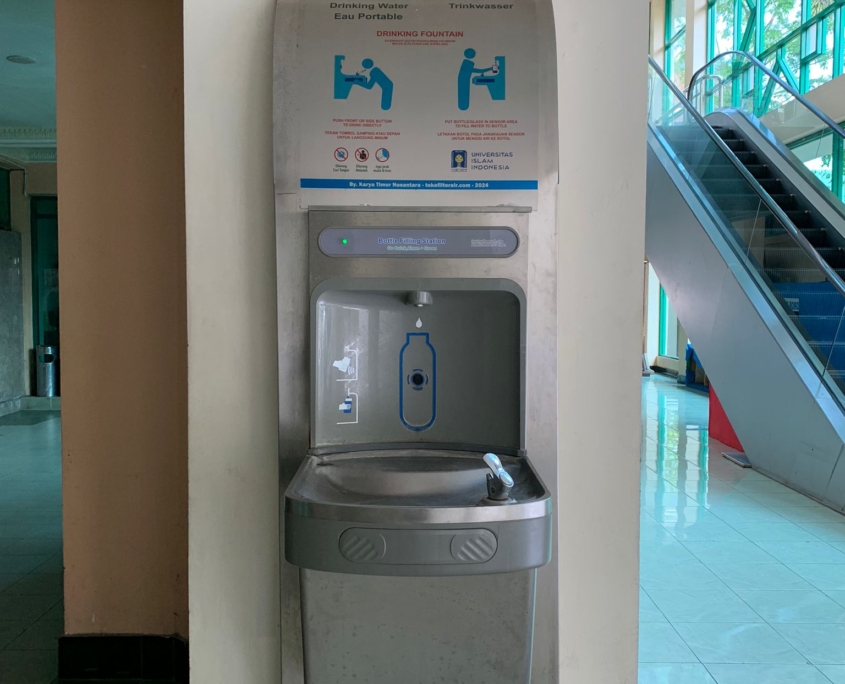
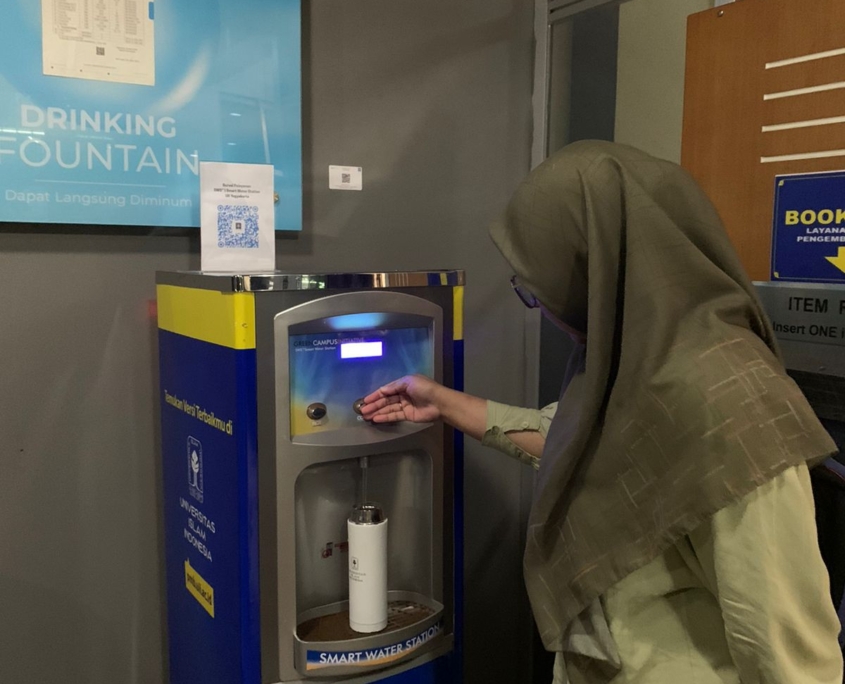
This initiative aligns with UII’s broader sustainability goals by reducing reliance on single-use plastic bottles. By providing free drinking water, the university fosters a culture of environmental responsibility, encouraging the use of reusable bottles and minimizing waste generation.
Through this program, UII demonstrates its dedication to creating a campus environment that prioritizes the well-being of its members while supporting sustainable practices. By addressing basic needs such as access to potable water, the university contributes to a healthier, more inclusive, and environmentally conscious community.
Universitas Islam Indonesia (UII) has established water-saving standards across its campus buildings as part of its commitment to sustainability and environmental stewardship. These standards ensure the efficient use of water resources and reinforce the university’s dedication to promoting sustainable practices.
The implementation includes the installation of water-efficient fixtures and equipment, such as low-flow faucets, dual-flush toilets, and automatic shut-off taps. These technologies are designed to significantly reduce water consumption while maintaining user convenience and functionality. By adopting these measures, UII actively minimizes water wastage in its facilities.
In addition to technological advancements, UII promotes awareness among students, staff, and visitors about the importance of water conservation. Educational campaigns and visible reminders in restrooms and common areas reinforce the university’s sustainability goals and encourage responsible water usage.
Through these efforts, UII not only reduces its environmental footprint but also sets a benchmark for sustainable water management in educational institutions. By combining infrastructure improvements with community engagement, the university ensures long-term conservation while fostering an environmentally conscious culture within its campus community.
As part of its commitment to sustainability, Universitas Islam Indonesia (UII) integrates drought-tolerant plants into its campus landscaping, exemplifying its proactive approach to water conservation. This initiative reflects UII’s dedication to reducing water consumption while maintaining a green and aesthetically pleasing campus environment.
One notable example of this practice is the planting of silk trees, which thrive with minimal water compared to other tree species. By incorporating these drought-resistant plants, UII significantly decreases the water demand required for landscaping, aligning with its broader sustainability goals.
Beyond their water efficiency, drought-tolerant plants like silk trees contribute to the campus’s biodiversity and create shaded, comfortable spaces for the university community. This thoughtful selection of plant species also minimizes the need for frequent irrigation, reducing both water usage and maintenance efforts.
Through these landscaping strategies, UII underscores its role as an environmentally conscious institution, setting a positive example for sustainable land management. This practice not only supports water conservation but also demonstrates the university’s broader commitment to integrating sustainability into all aspects of campus operations.
Universitas Islam Indonesia’s Commitment to Environmental Sustainability
Water Reuse Measures at Universitas Islam Indonesia (UII)
Universitas Islam Indonesia (UII) has established a comprehensive policy aimed at maximizing water reuse across its campus, reflecting its commitment to sustainable water management. This policy encourages innovative practices, such as reusing water from ablution (wudlu) for garden irrigation, ensuring that water resources are utilized efficiently and responsibly.
A key feature of this initiative is the implementation of a rainwater harvesting system. By capturing and storing rainwater, UII supports its campus activities with an alternative water source, reducing reliance on mains water and promoting environmental sustainability. These measures highlight UII’s proactive approach to integrating sustainable water practices into daily operations.
The policy has also been deeply embedded within the academic framework of UII, particularly through the Environmental Engineering Department. Students and faculty collaborate to design, implement, and monitor these systems, creating an experiential learning environment that fosters innovation in water conservation.
Through these efforts, UII not only enhances its campus operations but also contributes to broader sustainability goals. These initiatives demonstrate the university’s leadership in environmental stewardship and its commitment to educating future professionals on sustainable water management practices.
Universitas Islam Indonesia (UII) demonstrates its commitment to sustainable water management by actively measuring the volume of water reused across its campus. This systematic tracking allows the university to optimize its water use and ensure the effectiveness of its conservation initiatives.
One notable example is the water reuse system implemented at the Ulil Albab Mosque, where over 1,000 liters of water from ablution (wudlu) are repurposed daily for garden irrigation. This practice significantly reduces water waste while supporting the maintenance of green spaces on campus.
Additionally, UII’s rainwater harvesting system collects more than 5,000 liters of rainwater, which is utilized for various campus activities. By leveraging natural water sources, UII reduces its dependency on conventional water supplies, further contributing to its sustainability goals.
These measurement efforts not only enhance the university’s water-use efficiency but also reflect its broader commitment to environmental stewardship. By consistently monitoring and improving its practices, UII sets a benchmark for sustainable water management in higher education institutions.
Water in the Community Measures at Universitas Islam Indonesia (UII)
Universitas Islam Indonesia (UII) actively contributes to raising awareness about sustainable water management by offering educational opportunities to local communities and beyond. Through webinars, discussions, and events, UII fosters a deeper understanding of the importance of water conservation and efficient usage, emphasizing its relevance in addressing global sustainability challenges.
These initiatives aim to provide practical knowledge and insights into water management practices, making sustainability more accessible to diverse audiences. UII’s outreach extends to professionals, students, and community members, ensuring a broad impact and encouraging collaborative efforts toward environmental preservation.
One key aspect of these educational programs is their focus on practical solutions tailored to local contexts. By addressing challenges specific to water usage and conservation in Indonesia, UII empowers participants to implement sustainable practices in their communities and industries, bridging the gap between theory and action.
Through these efforts, UII not only strengthens its commitment to environmental stewardship but also contributes to national-level discussions on sustainable development. These educational opportunities position UII as a leader in promoting sustainable water management practices, both within and beyond the academic sphere.
Universitas Islam Indonesia (UII) extends its commitment to water conservation beyond the campus through impactful off-campus initiatives. One notable example is the university’s provision of thousands of biopores to local communities. These biopores, which are small, cylindrical holes drilled into the ground, facilitate rainwater absorption and help prevent water runoff, enhancing groundwater recharge and soil quality.
This initiative reflects UII’s dedication to supporting sustainable water management practices at the community level. By introducing biopores, the university empowers residents to take active roles in water conservation, fostering a collective effort to mitigate flooding and ensure sustainable water availability.
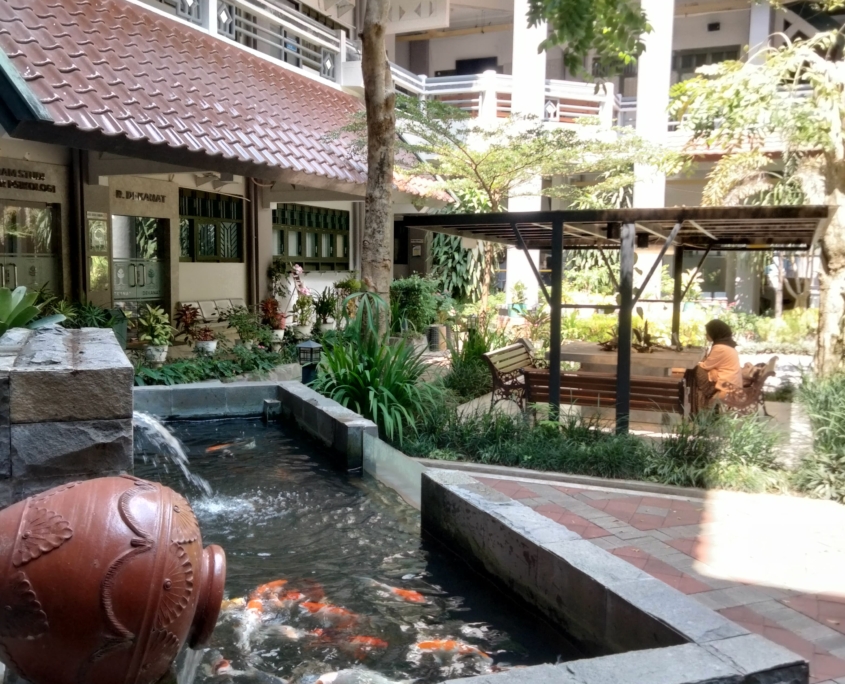
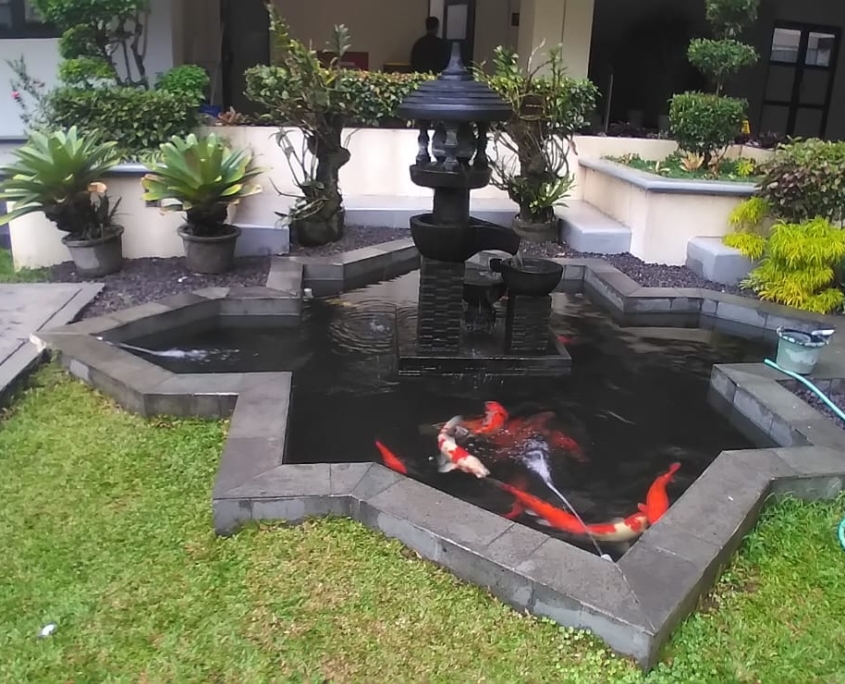
In addition to distributing biopores, UII provides education and training on their usage and benefits. This approach ensures that community members not only receive the tools but also understand how to utilize them effectively for long-term environmental impact.
Through initiatives like these, UII demonstrates its proactive stance in addressing water conservation challenges. By bridging university expertise with community action, UII contributes meaningfully to achieving water sustainability and advancing the broader goals of environmental stewardship.
Biopores as one of UII’s Commitment for Sustainable Environment
Universitas Islam Indonesia (UII) adopts sustainable water extraction technologies to support its environmental stewardship goals and ensure efficient water management on campus. Central to this effort is the operation of a water treatment plant that uses groundwater from deep wells as its primary raw water source. This facility underscores UII’s commitment to sustainable practices while addressing the university’s water needs.
The water treatment plant employs advanced filtration methods, including sand and carbon filters. These filters are designed for regular cleaning and reuse, extending their operational life and minimizing waste. This approach not only enhances the efficiency of water treatment but also aligns with sustainable practices by reducing the need for disposable components.
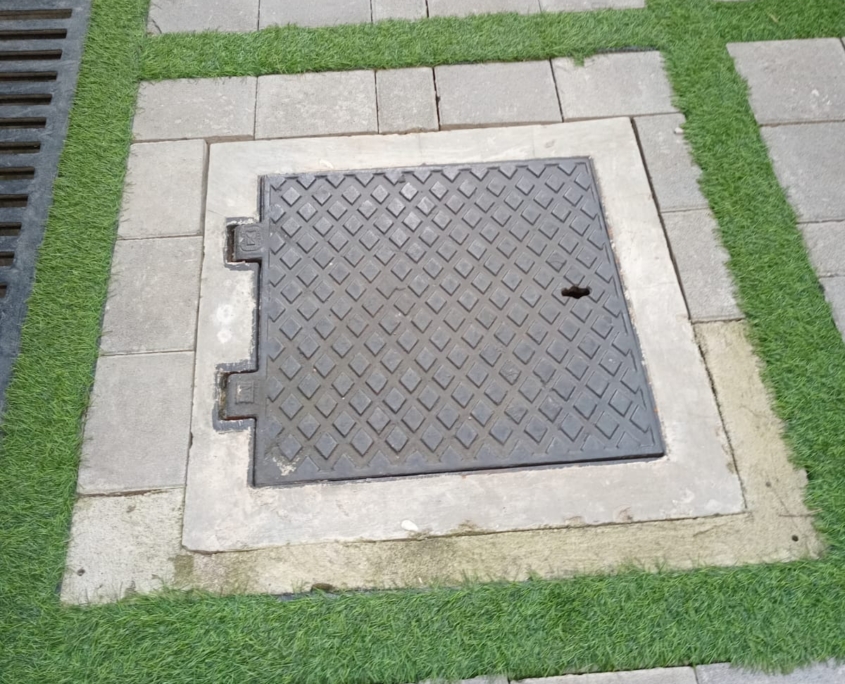
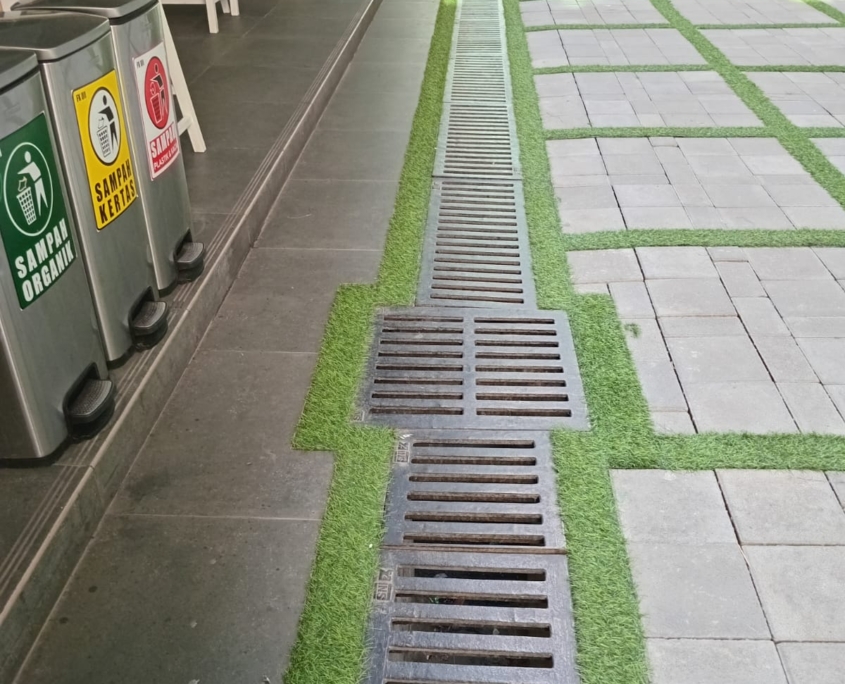
Beyond its operational purpose, the facility serves as a hands-on educational resource for students, particularly those studying environmental engineering and water treatment technologies. Students gain practical experience and insights into sustainable water management, preparing them to contribute effectively to similar initiatives in their future careers.

By integrating sustainable technology with academic enrichment, UII demonstrates its dedication to responsible resource use and education. This initiative reflects the university’s broader mission to foster sustainability both on and off-campus, setting a benchmark for environmentally conscious water extraction and management practices.
Universitas Islam Indonesia (UII) actively collaborates with governments and organizations at local, regional, national, and international levels to address water security challenges. These partnerships are central to UII’s commitment to sustainable water management and conservation, benefiting both the university and the broader community.
At the local and national levels, UII has worked closely with government entities to construct two large lakes on its campus. These lakes serve as vital resources for rainwater conservation, reducing surface water runoff, replenishing groundwater, and supporting biodiversity. This initiative demonstrates UII’s dedication to water security while contributing to the sustainable development of its surrounding area.
On the global stage, UII engages with international partners to develop and participate in water security programs. These collaborations emphasize knowledge exchange, research, and the implementation of best practices in water management. By leveraging global expertise, UII enhances its ability to contribute to innovative and effective water conservation strategies.
Through these cooperative efforts, UII not only supports the immediate water needs of its campus and community but also advances broader sustainable water management goals. These initiatives highlight the university’s proactive role in fostering environmental sustainability and addressing critical water security issues at multiple levels.
Water security initiatives by UII’s Water Quality Laboratory
Universitas Islam Indonesia (UII) actively promotes mindful water usage as part of its broader commitment to environmental sustainability. On campus, UII incorporates innovative water conservation strategies, including large lakes designed to collect and store rainwater. These lakes serve as a practical solution to manage water resources effectively while contributing to the campus’s natural ecosystem.
The university also prioritizes the preservation of open spaces that support rainwater absorption and minimize surface runoff. These spaces not only enhance water conservation efforts but also promote biodiversity and provide a serene environment for students, staff, and visitors.
In addition to its physical infrastructure, UII integrates water conservation principles into its community outreach efforts. Educational programs and collaborative projects aim to inspire individuals and organizations to adopt similar practices, amplifying the university’s impact beyond its campus boundaries.
By combining infrastructural innovations with educational initiatives, UII demonstrates its dedication to sustainable water management. These efforts highlight UII’s leadership in fostering environmental responsibility and its commitment to the Sustainable Development Goals (SDGs).

